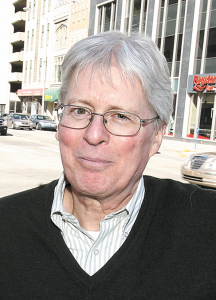Subscriber Benefit
As a subscriber you can listen to articles at work, in the car, or while you work out. Subscribe NowA Wisconsin trial judge has revoked the temporary admission granted to Indiana attorney James Bopp Jr., claiming the Hoosier applied “phony legal principles to invented facts.” But the Terre Haute lawyer is responding by calling the judge’s revocation “meaningless and pointless” and by filing what is a fourth appeal in an open records lawsuit that began in December 2021.

This latest fight in American Oversight v. Assembly Office of Special Counsel, et al., 21-cv-3007, was ignited Wednesday when Wisconsin Circuit Judge Frank Remington issued a 90-page supplement to his earlier ruling denying Bopp’s motion asking the jurist to recuse himself. The judge asserted he was responding to the inaccuracies in the recusal motion, but by the second page of the supplement, he had revoked the admission of Bopp and four other attorneys to practice law pro hac vice.
Bopp is representing the Office of Special Counsel. He filed the motion for recusal and a 40-page supporting brief last month. He maintains Remington was extremely biased against OSC and should have recused himself from the proceeding.
Remington described OSC’s brief in support of the recusal motion as, at times, unsupported, illogical and outright false.
“… (T)o read the brief casually is to witness fiction distilled from the disappointment of a losing party; a fever dream version of the facts of this case,” the judge stated in the supplement.
However, Bopp told Indiana Lawyer on Friday that the revocation applies only to this case in the circuit court and actually is coming after his admission had already been terminated because the legal battle in the trial court has concluded.
Still, he and the four other lawyers who had their admissions revoked are contesting the judge’s decision in the Wisconsin Court of Appeals. Bopp said the appeal was to counter the harm done to his reputation by Remington’s ruling.
“It’s a very unfair situation,” Bopp said, “in the sense the judge can say whatever he wants and he can use the language he wants and I’m very constrained. I can only look back and say what I said in the pleadings.”
Remington found Bopp and his team met the three grounds for revocation of pro hac vice admission: “manifestation of incompetency” to represent the client; not abiding by the rules of professional conduct; and an unwillingness to follow the rules of decorum.
“I revoke OSC’s out-of-state attorneys’ pro hac vice admission because the motion to which they have signed their names applies phony legal principles to invented facts. Near every claim they make is frivolous under Wisconsin law,” Remington wrote. “When I granted pro hac vice admission, I did so upon the condition they obey the Wisconsin Supreme Court’s rules for professional conduct. Revocation of that admission is appropriate upon three factors, including an ‘unwillingness to abide by the rules of decorum.’ … By filing this frivolous motion, these lawyers have met each of the three factors for revocation, and accordingly, their pro hac vice admissions are immediately withdrawn.”
Along with Bopp, the trial court revoked the admissions for attorneys Courtney Milbank, Joseph Maughon and Cassandra Dougherty, who are all listed on the Bopp Law Firm’s website, along with attorney Michael Massie.
The lawsuit against the OSC is connected to plaintiff American Oversight’s investigation into Wisconsin’s efforts to initiate a partisan review of the 2020 election. According to the American Oversight website, the public records lawsuit against OSC was seeking documents from the Wisconsin Legislature.
Bopp said his client was vindicated in the court case. Ultimately, he said, a subsequent search found OSC had produced all the documents that responded to American Oversight’s request.
However, in his supplement, Remington noted, “The timely production of records has been a central theme of this case … .”
Remington also highlighted an incident from court where Bopp explained the damage that might befall OSC after the release of the sealed records. When OSC did not produce one document as an example of that damage, the judge concluded the records not only did not contain confidential information, but that OSC was not aware of the documents it had turned over.
The judge went on to explain how the court had received the documents from OSC, comparing it to trash being dumped in his office.
“… I had received the records as 761 pages shuffled into a cardboard envelope,” Remington wrote. “Emails were out of order, even with others in chains of correspondence, as though deliberately misplaced. Nothing was chronological or otherwise part of a logical structure, with the exception of perhaps a dozen pages of Ron Heuer’s, John Ker’s, Harry Wait, and Mike Lindell’s emails.
“These 761 pages ended up on the floor of my office, where, over the course of several weeks, like a jigsaw puzzle, I reassembled them into the format which I could then discuss in my decision,” the judge continued. “To summarize: it would come as no surprise if OSC had simply emptied its trash into my office.”
Please enable JavaScript to view this content.
